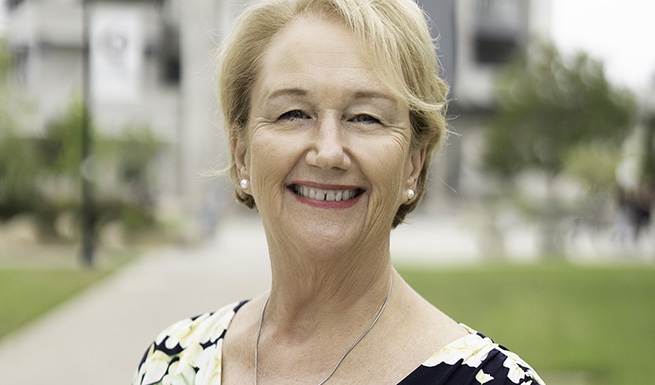“It’s always been part of my being to notice when people need things and find ways to raise money for it,” said Dr. Pamela Luster, TSDF Board Member and president at San Diego Mesa College.
She recalled childhood summers spent organizing youth in her area, dumpster diving for old textbooks to help them play school and facilitating “penny carnivals” to collect sleeves of pennies as donations to UNICEF.
Pamela’s passion for uplifting those that have historically faced a lack of access and ability challenges has only increased over time.
The Necessity of Basic Needs
Pamela’s fierce advocacy for basic needs reflects her own experience in college.
She worked a few part-time jobs to put herself through college and vividly remembers buying crackers and drinking out of the water fountain when the dining commons at San Jose State University would close on weekends.
“To be fair, I had friends, I could’ve gone to my grandparents’ house – I had people that could feed me,” Pamela emphasized.
“It wasn’t about scarcity as much as it was about that panicked feeling you get when you don’t know where your next meal is coming from,” she added, emphasizing the shame that one feels when they need help, and how those feelings increase for students that don’t have friends or family that are a phone call or short drive away.
The Hope Center for College, Community and Justice at Temple University published its fall 2020 Real College Survey research, and the results demonstrate that basic needs, especially those related to mental and behavioral health and food insecurity, are increasing among college students – particularly those who have been personally impacted by COVID-19.
“What we need to be doing is unapologetically seeking out resources that people need before they need them,” she realized.
“This has to be part of how we see the whole student, the whole person.”
Activating for Equity
Pamela started her career in community colleges after receiving her master’s degree and began teaching community college courses for students with disabilities.
In this role, she worked with students and faculty to help them understand the need to level the playing field for students with disabilities to have an inclusive, equitable college experience.
“That was the moment I started to think about equity work from an ability and access perspective,” she shared. “The jobs that I’ve been interested in or gravitated toward were almost always with the lens of education equity – how can we make sure students have access, success and completion?”
After nudging from friends and colleagues, Pamela completed her doctorate program with a dissertation focused on equity indicators for California community colleges and set her sights on becoming a community college president. She interviewed for her current role as San Diego Mesa College president with Dr. Constance Carroll, former TSDF Board Member and current Board Member with the San Diego Regional Policy & Innovation Center, who served as the San Diego Community College District’s Chancellor for 17 years and San Diego Mesa College’s president for 11 years.
Pamela underscored the value of collaboration in equity work, and forged a partnership and friendship with Dr. Keith Curry, president and CEO of Compton College and the Compton Community College District.
“Our students were devastated during COVID, and no amount of surveying can account for the trauma people are still feeling from that,” Pamela emphasized.
At the onset of the pandemic, Keith and Pamela took their thought leadership to Twitter through #EquityAvengers, weekly conversations the duo hosted on the social media platform to discuss the inherent inequities facing community colleges and overall access and academic success for students.
The #EquityAvengers conversations take place every Wednesday at 5 p.m. and have expanded to feature secretaries of education, historically Black college and university (HBCU) presidents, and more. The work got the attention of the College Futures Foundation which has invested in the project so that Pamela and Keith can expand their team and facilitate these conversations for a broader audience.
“This work from a coalition-building perspective needs to happen. We need to scale the work around equity and scale basic needs work,” Pamela shared.
“Good Trouble” in San Diego
“I feel so honored to be on the Board,” Pamela said of her leadership on The San Diego Foundation’s Board of Governors. She added that The San Diego Foundation’s mission to improve the quality of life in the San Diego region has always been part of her “why” for investing in human capacity, with a particular lens for those who don’t have access to the tools needed to build that capacity.
She “geeks out” over strategic plans and described them as “the way an organization can hold itself accountable.” The Foundation’s Strategic Plan pillar to foster equity of opportunity falls right in line with the work that Pamela has dedicated her life to.
While she will be retiring from her role as San Diego Mesa College president in June 2022, Pamela doesn’t plan to slow down.
“I want to be a helper, I want to be a connector, and being on the Board of Governors gives me an opportunity to do that because I get to see that bird’s eye view of philanthropy at its finest,” she shared.
“I’m all about busting systems that don’t work,” she added, emphasizing that she will continue to do so.
“I want to do a little ‘good trouble’ in the San Diego region.”




